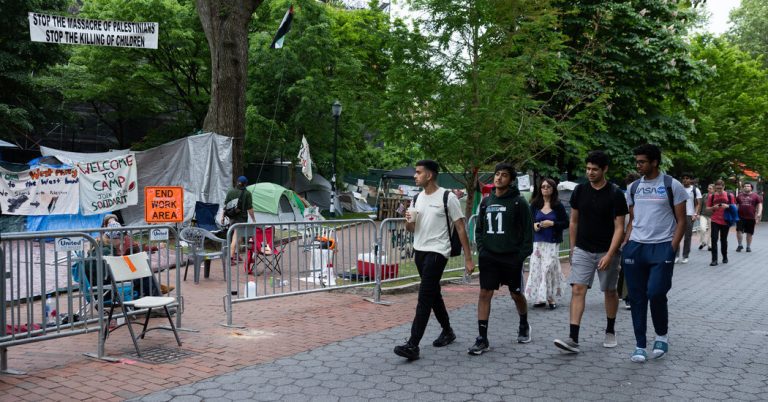The University of Pennsylvania issued interim rules Thursday that significantly limit campus protests and, for the first time, expressly ban encampments. The action came less than a month after police cleared a pro-Palestinian encampment at the university and arrested 33 people.
Dozens of encampments protesting Israel’s war on Gaza have erupted at universities across the country this spring, leading to more than 3,000 arrests since mid-April and heightened tensions between students and universities.
“To ensure the safety of the Penn community and to protect the health and property of individuals, camping and overnight demonstrations are not permitted on any campus, regardless of location (indoor or outdoor),” Penn’s new rules say to protests, adding: “Unauthorized activities during the night will be considered violations and dealt with.”
The rules also prohibit protests that prevent speakers on campus from expressing their views or “other members of the community from hearing or seeing the speaker.” And they prohibit students from displaying slogans on buildings or writing slogans on them with semi-permanent or permanent chalk or marker.
Penn administration said the new rules, which will be reviewed by a faculty-led task force in the 2024-25 academic year, were issued in response to calls for more clarity about what is allowed on campus.
The administration said the rules “are intended to allow free expression while allowing Penn to carry out its core missions of teaching, research, service and patient care without interruption.” The university said students who broke the rules would face disciplinary action, but did not elaborate.
The temporary rules will take effect immediately, said Penn interim president J. Larry Jameson, in a letter to university staff members.
Universities across the country are grappling with how to deal with pro-Palestinian protests, with leaders at times struggling to balance free speech with student safety on campus. The protests at Penn and other universities have contributed to threats to withdraw federal funding, led by Republican members of Congress.
On Monday, Representative Virginia Foxx, a North Carolina Republican who heads the House committee that has held several hearings on campus anti-Semitism, and the chairs of five other committees told Penn in a letter that they were conducting a review of the university’s right in federal funds.
Similar letters were sent to nine other universities, including Harvard, MIT, Rutgers, Northwestern and the University of California, Berkeley.
Penn’s new rules are a direct consequence of the protests that rocked the university for most of the past academic year.
In May, police suppressed at least two protests: Days after clearing the encampment, they arrested 19 people trying to occupy a university building. In response to the crackdown on the camp, the executive committee of Penn’s chapter of the American Association of University Professors condemned what it called a “repressive action” by the school’s administration and “a cowardly, shameful attempt to silence and punish speech.”
But the unrest at Penn began before the October 7 attacks by Hamas in Israel. Jewish alumni and organizations had pressured the university’s president at the time, M. Elizabeth Magill, to cancel a Palestinian literary festival planned for September, which they said had become a platform for anti-Semitic rhetoric. Denied.
Ms. Magill’s support eroded as pro-Palestinian students demonstrated on campus, donors threatened to withhold tens of millions of dollars and Penn’s business school advisory board demanded the university change its leadership.
Her fate was sealed on December 5, when she testified before Congress along with the presidents of Harvard and MIT. When asked whether calling for Jewish genocide would violate university codes of conduct, all three presidents said it would depend on the context, which leading to an uproar and calls for their resignation.
Four days later, Ms. Magill resigned, ending the shortest tenure of any Penn president. About a month later, Harvard President Claudine Gay also resigned.
When Columbia President Nemat Shafiq testified before the same House committee in April, he took a different tack, calling for police to clean up an encampment a day after the hearing. That approach backfired as some faculty members accused her of trying to appease Republicans, and the action sparked a nationwide protest movement.
Some camps, including Harvard, have been dismantled peacefully through negotiations. Others have been cleared by the police. But even the negotiations have not stopped universities from punishing students, who in some cases have been barred from receiving their degrees and marching to commencement, pending the outcome of their disciplinary cases.
Mattathias Schwartz contributed to the report. Susan C. Beachy contributed to the research.




